The prince of Transylvania, Stefan Batory, would not have become a Polish king if he had not agreed to marry the eccentric princess who was advanced in years. Anna Jagiellonka was to be his partner, and even a counterweight to his position. And who did she actually become?
After an embarrassing disgrace, which should be considered the secret escape of the king, the young Frenchman Henryk Waleze, the Poles decided to protect themselves. The last of the Jagiellonian family, Anna - daughter of Zygmunt Stary and sister of Zygmunt August - has so far been exposed to constant insults and general contempt. Now, unexpectedly for herself, she has become a key figure on the political chessboard.
Before the election of the man to rule the Polish-Lithuanian Commonwealth, in December 1575 she was not even hailed as a queen, but - a woman-king, modeled on the heroine of the great interregnum from two centuries ago, Jadwiga Andegaweńska.
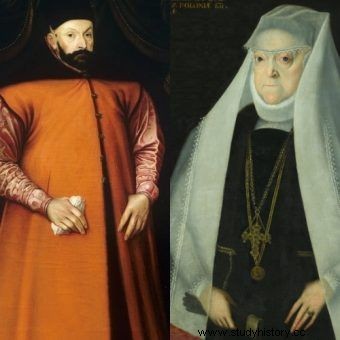
Stefan Batory and Anna Jagiellonka in portraits made during their lifetime
Each candidate for the Polish throne, starting in a fierce election, had to reckon with the fact that he would marry Anna - a woman over 52 years old, known for the Old Population customs and giving no hope of giving birth to a descendant. And the same:to create a new dynasty. Stefan Batory was ten years younger than Anna. Like it or not, he accepted the condition.
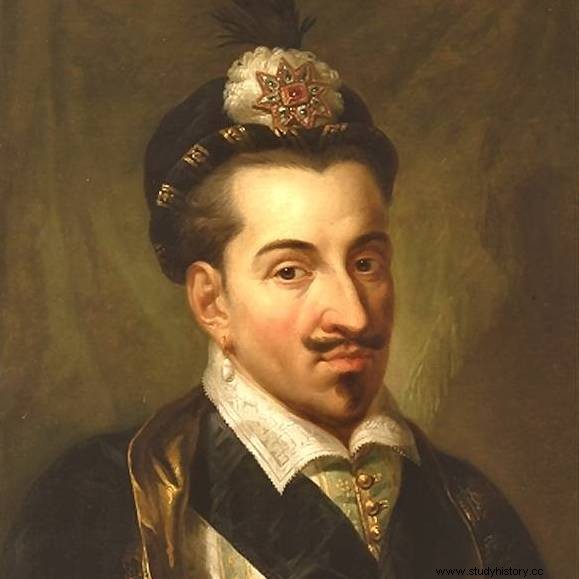
Henryk Walezy according to Marcello Bacciarelli. After his short reign, the Poles became much more cautious and prudent ...
On May 1, 1576, he married the queen at Wawel, and only then was he crowned a new sovereign, or rather, a royal spouse with an uncertain position. There was still the consummation of the relationship.
Marriage or fiction?
We know mainly about Anna and Stefan's wedding night that ... the tradition has been followed. The king, "sharing the bed with the queen, made a vow," summed up the then politician and chronicler of events, Światosław Orzelski. The next day, Anna received the due gifts, always given to the brides on the day after the completion of the relationship.
Batory presented her with precious bracelets, necklaces, breastplates and a cup filled with coins. In addition, he conveyed through intermediaries his expressions of satisfaction with the wedding night and hopes for a further successful relationship. But that would be it.
As befits a conscientious politician, he fulfilled his duty, but he did not intend to uphold the fiction he believed to be a marriage. Anna was deluded for a long time.
Three nights of harmony
One of the agents of the Apostolic Nuncio noted that the king spent only two or three nights in the queen's bedroom. Later, when he stopped showing up at her place, Anna tried to take matters into her own hands. Not caring about rumors, she went to the royal alcove.
When years ago the desperate and unwanted Queen did the same Elizabeth of Habsburg , the whole criticism fell on her husband Zygmunt August who was neglecting her . Now the courtiers were laughing not at the king but at the queen. Especially that the ruler avoided her with impressive determination.
The first time, Anna unsuccessfully waited for her spouse for five hours. For the second - for seven. But Stefan Batory did not show up.
"Since she caught up with the peasant, she keeps her mouth high"
Anna - ambitious after her mother but not as skilled in politics as she was - still hoped that as queen she would have at least some power. "Since she caught up with the peasant, she carries her mouth high and proud," wrote one of the witnesses to the ceremony a few days after the wedding. Already in this letter, however, there is a prediction gloomy for Anna:"I can see from him that he will not be ruled, because he is a righteous peasant!".
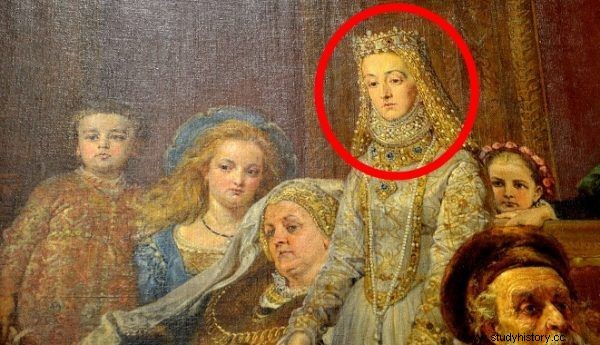
Anna Jagiellonka in the painting "Union of Lublin" by Jan Matejko
Indeed, Batory neither asked nor expected his wife for political support. He quickly proved to be a talented strategist and successfully suppressed opposition resistance. He announced that he would not be a painted king, and he could switch from words to deeds in the blink of an eye. Everyone forgot that he was to be the spouse, and Anna - the king. This became clear at one of the court ceremonies.
Batory politely allowed his wife to walk beside him. The ceremony was clear in this regard:the king should always go first, and the queen should follow. Even the mighty Bona Sforza followed this rule. This time, however, one should pay attention to the special status of Anna.
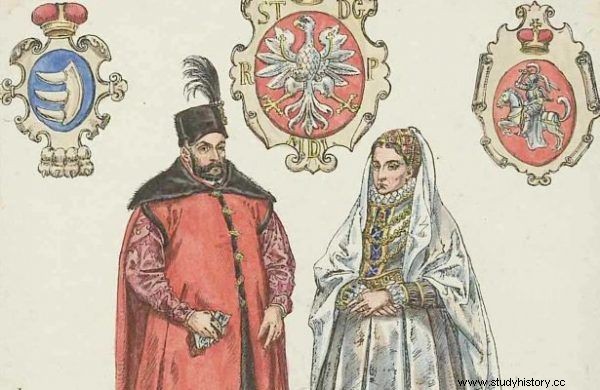
Stefan Batory and Anna Jagiellon in the image of Jan Matejko
According to the election diploma, she had a rank equal to or even higher than that of Batory. The king's entourage was not going to respect this. The royal court marshal, Andrzej Zborowski, publicly rebuked the queen and told her to take her right place. Or at least correct in his opinion.
"Mrs. Infanta is very dissatisfied"
The Queen actually only acted once in those first weeks. She sent a letter to Rome, appealing to the curia to accept her husband's election and to stop supporting the Habsburgs in the struggle for the Polish throne. Batory did not thank her for it. I think he was even annoyed to see the woman interfering with his affairs. Conflict was becoming inevitable.
"Mrs. Infanta is very dissatisfied, not having the authority she expected and not being satisfied by the company of her spouse," wrote Nuncio Wincenty Laureo. Even so, she still didn't give up. Sources say that she tried to prepare "banquets, balls and constant entertainment" for Batory. The effect was counterproductive.
As a born soldier, the king was bored at court, and he considered spending money on organizing frantic games to be a waste. On one occasion, he sneered at Annie that he did not think he could afford such a lifestyle. Other times - he just missed the banquet.
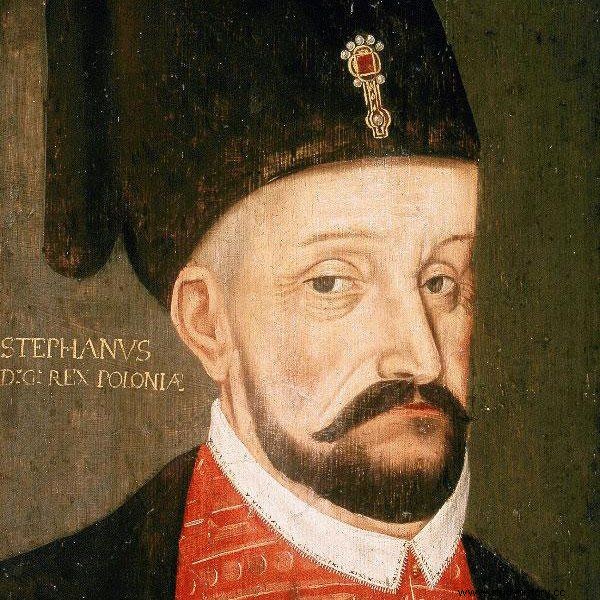
Stefan_Batory in a modern portrait
Nuncio Giovanni Andrea Caligari informed the Pope:
She ordered the queen to light the halls and prepare musical instruments to give a ball to her maids and courtiers. However, when she received the news that the king would stay in Lithuania, she ordered the lights to be put out and the instruments to be taken out, and with great anger she retreated to her chambers.
The same observer stated in August 1578:
The quarrel between the king and the queen cannot be resolved. They say here that the king does not trust her, that he is afraid of the poison from her hand, an art her mother Bona was well versed in.
Widow during my husband's lifetime
Meetings of the royal couple became less and less. Even if Stefan visited Anna, he would spend no more than a "bite of time" with her. Intermediaries and stiff formal greetings from the spouses became the norm. Anna tried to be respectable and polite. Under the mask of seriousness, however, emotions were buzzing.
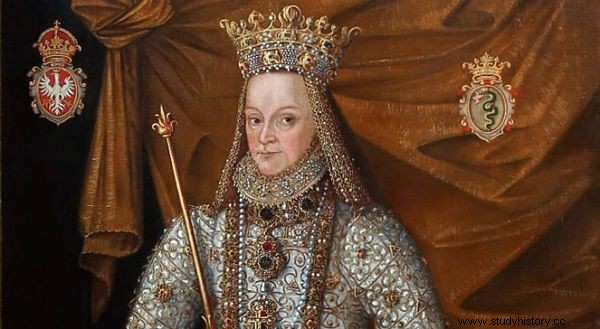
Anna Jagiellonka in the coronation portrait.
Bona's daughter couldn't get over that her career ended before it even started. For a brief moment, it was needed by nobles and magnates to achieve their goals. And as soon as it ceased to be - they dumped it in the dustbin of history. Now she was doing her best to get attention.
In an awkward, downright stupid way, she began to meddle in conspiracies against her husband. It's hard to believe that she really wanted to harm him. I guess she was just trying to focus Stefan Batory's interest on herself. She chose the worst possible way once again.
The king's entourage began to ostentatiously suggest that the monarch should divorce and found a new dynasty. Admittedly, Batory himself emphasized that he did not even think about such an unholy act, but the signal was clear to Anna.
The year was 1580 and all misunderstandings were over. Anna stopped interfering with politics, let alone messing around with her husband. Stefan cut off contact with her completely in response. He spent all his time in wars with Moscow or in Grodno, where his son grew up from an extramarital relationship. Meanwhile, Anna moved from Krakow to Warsaw. And she accepted that she had actually become a widow before her husband's death.
Source:
You can learn more about the sad fate of Anna Jagiellon in Kamil Janicki's book. Ladies of the golden age (Horizon Label 2014). The article is based on the literature and materials collected by the author during the work on the book.
